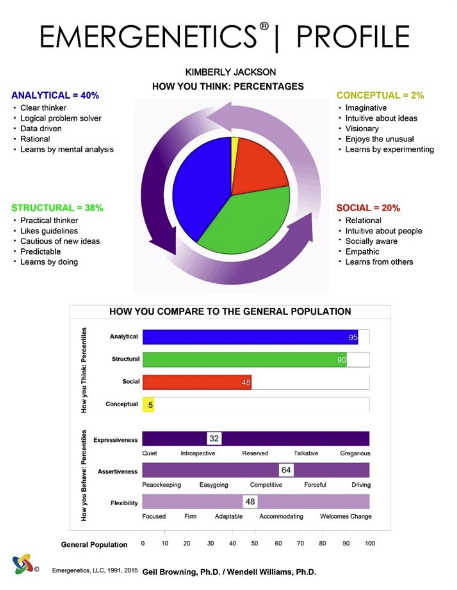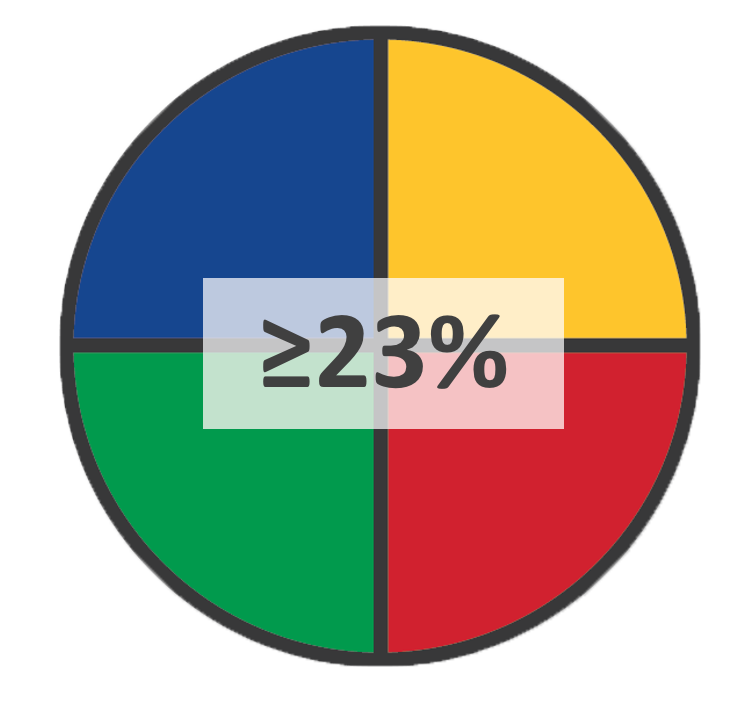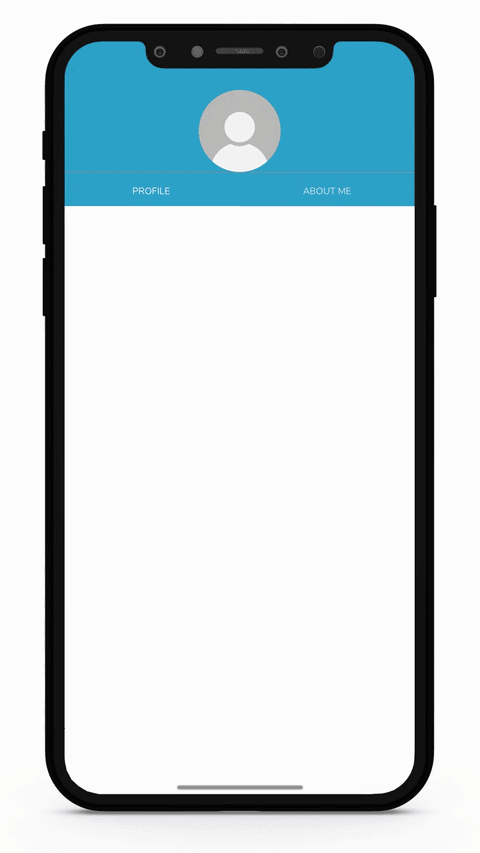A personality test can be a powerful companion to an organization’s employee development initiatives as it seeks to amplify job performance and workplace culture.
The drive to understand the personality traits of coworkers, family members, friends and the world at large is not a new phenomenon. Personality has been studied and researched for centuries and the resulting personality tests have been widely used in spaces ranging from team building to therapy. Read on to learn what personality assessments are, the history of their design and how they can be positively and effectively applied in the workplace.

Personality Assessments 101
The APA describes a personality assessment as:
“A proficiency in professional psychology that involves the administration, scoring and interpretation of empirically supported measures of personality traits and styles in order to refine clinical diagnoses, structure and inform psychological interventions and increase the accuracy of behavioral prediction in a variety of contexts and settings, such as educational or organizational environments.”
A Brief History of Personality Tests
People have been trying to understand the underlying factors that make a person tick for most of written history. In ancient Greece, Hippocrates described the four temperaments (sanguine, choleric, melancholic and phlegmatic) that may make up an individual’s personality type, drawing connections between their nature and their health. Records suggest that the foundations of this theory of the humors have even earlier origins in Mesopotamia.
Through academic psychology and psychological research, many professionals have studied and cataloged various personality inventories. Gordon Allport was one of the pioneers in the field and ultimately created a list of 4,000+ traits. Over the years, this listing has been narrowed by psychologists like Raymond Cattell, who identified 16 factors, and Hans Eysenck, who posed just three traits.
One of the most popular personality theories today is referred to as the “big five,” which distills five traits in humans:
- Extraversion
- Agreeableness
- Conscientiousness
- Openness to experience
- Neuroticism
The five-factor model is often used as the foundation for many personality testing instruments, and in the early 2000s, the International Personality Item Pool was designed to measure the Big Five. It now contains more than 3,000 items that can be used for personality tests.

The Value of a Personality Assessment in the Workplace
Psychological theory and personality testing have been used in a multitude of ways, and through applied psychology, personality characteristics have been considered in a variety of contexts. Certain personality assessments are often introduced in therapeutic settings, supporting psychological counseling and family therapies. They may also be used to assess personality traits like the dark triad.
Emergenetics’ personality test is most commonly used as a workplace application, where personality types may be assessed in support of several desired outcomes including:
Limitations of a Personality Assessment
It is important to remember that there is not one personality test that can capture every single facet of what makes a person who they are. These assessments should be considered as an avenue to bring more insight into a person’s work style or approach, not a definitive listing of everything that an individual needs to know about themselves, their own emotions and tendencies, or others in their organization.
Another consideration is that most personality assessments are self-reports, meaning that respondents must answer honestly and not simply select the items they believe to be socially desirable to ensure that the results are accurate reflections of their personality attributes.
HR professionals should take note that not every personality test should be used as part of the hiring process to support a hiring decision. Many tools are not measuring cognitive ability, or a person’s capacity to complete a job. These tests are simply assessing a person’s preferences and inclinations toward different traits, which do not necessarily align with specific skills or job fit.

At Emergenetics, we often talk about the difference between preference and ability. While a person may prefer a certain approach to their work based on their traits, they may still be highly skillful at aspects of a job that are unrelated to their innate tendencies.

If your company has an interest in using assessments in the hiring process, be sure to consult the provider to ensure that the assessment supports skills testing and can legally be used in this way. If not, do not use personality tests as part of the hiring decision.
To support validity, users should analyze tests through the lens of their reliability. Some assessments may use a point-in-time approach, where the results are expected to change based on new learning or practice. Others may consider a period in one’s life.
As an example, as kids’ brains develop, changes are likely to occur at different stages. Just think about how your own adolescent self-image may vary from your perceptions today. Still, other tests are reliable in that the personality characteristics they measure remain consistent throughout one’s life (or at least, adult life).
Remember not all “personality tests” should be considered for workplace application. You may also be familiar with many online quizzes from popular publications trying to assess traits like your excitement seeking tendencies based on your favorite color or your propensity for problem-solving based on your choice in TV shows. These assessments, while fun, are not useful in workplace contexts. Instead, it’s essential to utilize an instrument based on its applicability and legitimacy.
The Construction of a Personality Assessment
Personality Test Styles
Most commonly, personality testing is done through two methodologies: self-report personality tests and projective techniques.

In a self-report approach, a person may read a series of questions and rate their responses based on how well each statement describes them. Many tests will use a Likert scale, asking participants to respond to a question on a scale of strongly disagree to strongly agree, while others may use true false questions. Some examples of widely used self-report assessments include the Emergenetics Profile, Myers Briggs Type Indicator and DiSC Assessment.
In a projective test, the individual may consider a situation, object or scene. They are then asked to interpret the item or express how they may react or perform within certain circumstances. The Rorschach Inkblot Test is one example of a projective assessment.
Essential Considerations When Choosing a
Personality Test
There is a whole universe of personality assessments to explore including the Emergenetics Profile, the Myers Briggs test, CliftonStrengths and so many more. Each of these tools measures different personality traits; however, there are important distinctions between tests, particularly in the workplace.
What Sets Emergenetics Apart

In the realm of personality inventories, it’s no surprise that we believe the Emergenetics Profile is a superior instrument. Unlike most tests, our assessment measures both thinking and behavioral traits, which among other important factors, allows our tool to provide a more complete picture of how a person prefers to approach their work and their life.
What Personality Traits Our Test Measures
The Emergenetics Profile measures an individual’s preference for three Behavioral and four Thinking Attributes.
Behavioral Attributes
A Behavioral preference is defined by the percentiles at the bottom of the report. Each Behavioral spectrum measures how a person compares to the population. A preference is defined by thirds, meaning an individual may have first-, second- or third-third tendencies, which help to describe their personality types.
![]() The Expressiveness Attribute measures a person’s outward display of thoughts and emotions toward others and the world at large. Individuals in the third-third are often talkative and process their thoughts out loud while those in the first-third are typically quiet and process their thoughts internally. People in the second-third may gravitate toward either style depending on the topic at hand or how they are feeling that day.
The Expressiveness Attribute measures a person’s outward display of thoughts and emotions toward others and the world at large. Individuals in the third-third are often talkative and process their thoughts out loud while those in the first-third are typically quiet and process their thoughts internally. People in the second-third may gravitate toward either style depending on the topic at hand or how they are feeling that day.
Thinking Attributes

To assess the Thinking Attributes, we consider an individual’s perspective on each Attribute. While the middle bar chart reflects how the individual compares to the world at large, the pie chart at the top of the Profile defines a personal preference. If a particular Attribute has a percentage of 23% or greater in the pie chart, then that Attribute is a preference.
![]()
The Analytical Attribute appreciates logic and reasoning. This Attribute often is a natural skeptic, driven by the burning question of “why.” A person with this preference is likely to seek out evidence and data and often enjoys complex problem-solving through mental analysis.
Benefits of Using an Emergenetics Personality Assessment
The Emergenetics Profile provides individuals with a better sense of who they are, how they prefer to approach their work and how their preferences might compare to others. Some of the reasons why organizations choose to invest in our programs as compared with the many tests (including free personality test options) available in the market include:
- Ease of Use and Applicability
- Validity and Reliability
- Comprehensive Approach
- Strengths-Based Focus
- Consideration for the Entire Workforce
- Commitment to Cognitive Diversity and Inclusion
If you’re interested in learning more about our science, including how our assessment relates to personality inventories like the five-factor model, be sure to explore our technical report.
Common Uses of Emergenetics
Understanding one’s own personality and that of others provides a great deal of relevant information not only for individuals but also for the organizations that choose to use a personality test. We partner with companies, nonprofits and educational institutions in a variety of settings to achieve important goals, such as:
- Leadership and Management Development
- Team Development and Productivity
- Soft Skill Building
- Innovation and Change Management
- Diversity and Inclusion
- Employee Engagement and Culture Building
Please note: One area our assessment does not support is the hiring process. Our test measures preferences, not abilities, and we recognize that these preferences do not innately preclude or inspire anyone from finding success in any role.
Applying Emergenetics in the Workplace
Personality tests are a practical tool within a learning and development program. For employees to utilize their personality insights and use them to effect positive change in a team’s dynamics, a person’s leadership or a company’s culture, it is necessary that these assessments are referenced and utilized regularly.
Our workshops, digital courses and on-demand resources allow leaders, managers, teams and individual contributors to utilize the general knowledge from their Profiles and apply them in new ways to drive success. Our tools empower employees to learn more about how they can use their strengths to increase their own productivity as well as improve the ways they work with others.

Essential Workshops
Our essential workshops include the Meeting of the Minds and Team Dynamics for Small Groups. These sessions provide individuals with an understanding of the strengths of every preference and the power of cognitive diversity. They also help teams discover strategies to collaborate more productively and positively.
Power of WE
In addition to the essential programs, Emergenetics offers a series of sessions that support intact teams, departments or groups assembled for a particular project in addressing common workplace challenges, including:
- Accelerating team performance
- Building trust
- Crafting team norms
- Fostering innovation
- Managing change
- Respecting differences
The egLearning Library
The 20-minute digital learning courses provide participants with an opportunity to expand on their knowledge of Emergenetics and use the seven Attributes to improve job performance by building skills in personal productivity, conflict management, communication and more. Our offerings include:
- Ignite Your Preferences
- Learn to Flex: Behaving to Match Rapport
- Learn to Flex: Thinking to Build Connection
- Cultivating Culture Through the Language of Grace
- Hone Your Habits: Managing Stress
In each program, participants will stretch their thinking and set commitments to put their newfound knowledge into practice.
On-demand Support
All Emergenetics Profile holders also receive access to Emergenetics+ via our mobile app or online portal. From one platform, they can access all sorts of resources right at their fingertips. They may connect with friends and colleagues, who also have Emergenetics Profiles, to get customized tips to improve communication and relationship building based on everyone’s personality.
They may create saved groups of their departments or project teams and receive tailored recommendations to use cognitive diversity to amplify performance. The app has a robust library where participants can also access templates and resources to discover how to give recognition, deliver feedback and more by considering the preferred Attributes of their colleagues, direct reports and teammates.

Personality tests can make a significant difference in the success of organizations and their people. It all starts by choosing the right partner to help you achieve your objectives. We recognize that are a multitude of personality assessment companies to choose from, and while we believe we are one of the best, we also recognize that you will likely wish to do your own research and come to your own conclusions.
In addition to exploring this article about personality tests, we invite you to review our Buyer’s Guide as part of your process in finding the best solution for your workplace needs.

